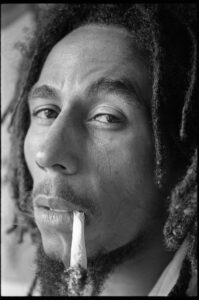
No one in the world is as closely associated with cannabis than Bob Marley. It was an important part of his life, as often told through his legendary music.
“Herb is the Unification of Mankind”
Bob Marley
In his vision for a better world, one united by love, respect, and social justice, Bob advocated for the positive power of herb–to liberate our creativity and encourage our reflection.
With Marley Natural, we continue this legacy– one inspired by his deep respect for nature, for its power to awaken our well-being–to more fully realize the many benefits of cannabis for the mind, body and spirit.
As agents of change, we promote positivity, connectivity, and personal transformation. And as believers in progress, we offer an exceptional lifestyle line that is inspired by Jamaica’s vibrant energy. We are proud to carry on Bob Marley’s legacy.
Medical Marijuana
The Marijuana plant is scientifically referred to as Cannabis. Cannabis can include Tertahydrocannabinol (THC), the element that produces the “high”, and Cannabidiol (CBD), which does not have mind altering effects, but has been shown to have medicinal and therapeutic properties used to relieve pain, treat nausea, relieve stress and anxiety, as well as many other benefits, although more studies are needed.
Persecution of Rastafarians
Rastafari is tied to the identity of the Jamaican culture and has been used to promote the island as a tourist destination for generations yet Jamaica has a long history of persecuting Rastas.
The Rastafari philosophy is rooted in Ethiopia, giving reverence to Emperor Haile Selaissie I and stemming from the prophecies of Marcus Garvey, a pan-African Jamaican. Based on these teachings of Marcus Garvey, a new consciousness was ignited among the already disgruntled Black Jamaican population. This movement advocated for self-sufficiency, a naturalistic approach to development and, notably, for the ritual use of cannabis, which was formally outlawed in 1911. Rasta pioneers grew and utilized cannabis – and other crops – for commerce as well as for the spiritual properties.
The Colonial British Government of the time could not accept that a group of conscious Black people were existing in relative freedom and defiantly using a banned substance and in 1954 the Rasta leaders were roundup and their crops were destroyed.
The discrimination against Rasta would continue after Jamaica’s independence, to include the “Bad Friday” – which saw over 150 Rastas either beaten, their locks shaved off, and killed by police and military in the days before the nation celebrated Easter.
Through this period, and especially with the emergence of reggae in the 1970s, Rasta and other like-minded Jamaicans used music as a means of protest and to bring attention to the central role of cannabis to Rasta and, by extension, to Jamaica’s appeal.
These ideas found their greatest expression in the music of Bob Marley, still one of the strongest voices against oppression and for the legalization of cannabis.
After decades of persecution and repression, the new legislation importantly recognizes the rights of Rastafarians – who make up about 2% of Jamaica’s population- to cultivate and use marijuana as part of practicing their faith.
Herb Use in Rastafari Culture
Rastas use marijuana as a part of a religious ritual and as a means of getting closer to their innerself, Jah (God) and the natural world.
Rastas see marijuana as the herb of life mentioned in the Bible and many Rastafarians also believe that herb was growing at King Solomon’s grave.
Rastafarians sometimes gather in large social groups for a “Reasoning” that can include prayers, drumming, and chanting as well as the sharing of a big smoking pipe called a chalice. Sharing the chalice in this manner is akin to the ritual of taking communion like some Christian denominations.
Hours of Operation
Monday to Saturday – 10:00 AM to 6:00 PM
Sundays – Closed